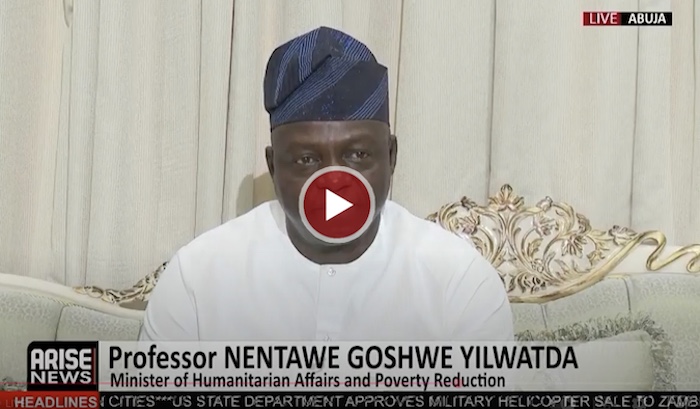Our Terms & Conditions | Our Privacy Policy
Yilwatda: Humanitarian Ministry Expanding Digital IDs to Reach 70 Million Households with N75,000
The Ministry of Humanitarian Affairs and Poverty Reduction, Professor Nentawe Goshwe Yilwatda has said he is working to enhance digital identities for the poorest Nigerians by collaborating with the National Identity Management Commission (NIMC) to expand the database.
In an interview with Arise News on Wednesday he said the initiative is aimed to increase conditional cash transfers to 18.1 million households, with a target of reaching 70 million households by 2025, each receiving N75,000.
“The target of the president is to reach 15 million households, with each household averaging four to five people. We are discussing targeting roughly 70 million individuals with about N75,000 per person in 2025.”
Speaking on the state of affairs, he said, “The poverty figures are staggering. This is the reason why we are suffering, especially malnutrition. Firstly, it is the issue of climate change. We had a lot of communities destroyed by flooding from Borno State, Bauchi, to Adamawa, and from the northwest from Kano to Zamfara, including Jigawa. They were affected by flooding and so on.”
He added, “A lot of farmlands were distorted by flooding. So, it is expected that many people affected by flooding and climate change, without farm insurance, will be deeply affected by poverty and malnutrition. We also have communities suffering from poor rainfall, especially in the far north. The effects of desertification are impacting them, so crops may not do well because of climate issues. The government sees this as a primary issue that we need to address.”
Despite these challenges, the Minister noted progress in reclaiming areas affected by insurgency. “We are improving in terms of more communities being recovered and the number of farmlands that people can access and farm,” he said.
In efforts to alleviate poverty, Professor Yilwatda explained, “As of last year, from October through December, we paid 5 million households the first tranche of Conditional Cash Transfers across the country. The second and third tranches were paid to 1.4 million households each.”
He attributed the reduction in the number of beneficiaries to new guidelines from the presidency. “The president has directed, based on CBN’s new regulations, that before any payment is made to an individual or household, they must have a digital identity we can trace. That is the NIN number.”
Currently, only 1.4 million of the poorest Nigerians in the database have digital identification numbers. “We are doing the data capturing, but for now, the poorest of the poor that we have in our data is only 1.4 million with NIN. We are working with NIMC, deploying resources, and conducting training. NIMC has brought in more devices under a program with the World Bank to assist us in data capturing for those without NIN numbers.”
The Minister detailed ongoing efforts, saying, “We are training in some states like Rivers, Kwara, Abuja, and Nasarawa, among others, and deploying to these states in the first round. By the end of January, we want to deploy across the 36 states to start capturing the NIN numbers of up to 18.1 million households. This will enable us to make payments to them for Conditional Cash Transfers.”
Looking ahead, Professor Yilwatda outlined an ambitious plan. “The target of the president is to reach 15 million households, with each household averaging four to five people. We are discussing targeting roughly 70 million individuals with about N75,000 per person in 2025.”
He added, “If we are able to reach 15 million households and pay each N75,000, it will help them in several ways. This includes providing financial literacy to start small businesses or go into agriculture. It will also enable them to buy farm inputs, improve production, and expand their businesses. This will support the poorest households and lead to overall improvements in production across the country.”
The Minister emphasised additional support for displaced individuals. “We are also working with the IPD to assist displaced people,” he said.
Addressing concerns about transparency, the Minister stressed the measures taken to prevent mismanagement of funds. “There is no physical distribution of cash to anyone anymore. You will never see anyone in the ministry distributing cash in markets, stadiums, or other public spaces. That has stopped.
“What we are doing now is transferring money directly to individual accounts that have been captured. We are digitising the processes, capturing all digital identities of people in the social register, and geotagging every home,” he explained.
To combat unemployment, the Minister revealed plans to connect youth directly to market spaces and the private sector. “We believe that if we implement more of these programs this year, as the president has directed, we will massively reduce the number of people affected by poverty,” he said.
Boluwatife Enome
Follow us on:
Images are for reference only.Images and contents gathered automatic from google or 3rd party sources.All rights on the images and contents are with their legal original owners.



Comments are closed.